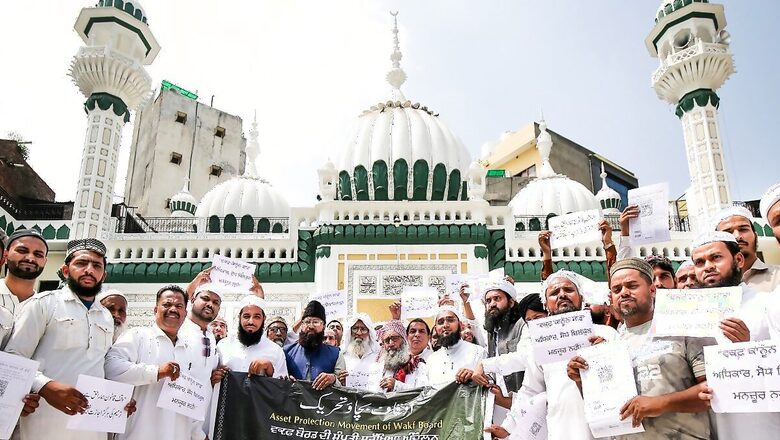
views
The fact that the aboriginals of Bharatvarsh, colloquially known as Bharatvasis, have maintained that their culture is eternal or timeless supports the use of the lexicon involving ‘Sanatan’ when elaborating on the concepts of the nation-state, civilisation, culture, or religion. In today’s day and age, we loosely refer to them as Hindus. Hindus have been fighting—incessantly—the “foreign powers” on one hand, while bearing the wedge of colonial imperialism for over 1000 years. One should also not be taken aback by the fact that, over the course of a civilisation as ancient as ours, there were times when Hindus seemed to shudder, many times dolorous and despondent, but there are also times when we see them reaching a “zenith of exuberance”.
Interesting to point out here that, unlike Hindus, Muslims have an entirely different worldview. From the alleged advent of Islam in 610 AD to this day so far, Islam and the Muslims have never been subjected to a phase of renaissance—like other major religions and societies—where the cult-turned-religion underwent an ideological revolution and Muslims engaged in introspection. Proselytising since inception, but as a matter of luck, the Muslims were never forced to convert, even in cases where they were vanquished and subjugated on their lands by external aggressors. Christians conquering Islamic Turkey’s Ottoman Empire serves as a classical example where Muslims were trounced but they were not forced to convert to Christianity.
For Muslims, to this day and age, the mediaeval way of life, jurisprudence and beliefs continue. Some infamous tenets—incongruous and incompatible today—include the radicalised and fundamentalist means to sift humanity into two kinds: one’s own (believers) and others, infidels (non-believers).
One issue that tangentially touches the integrity, sovereignty, communal harmony and equity of justice in our nation is the contentious Waqf Amendment Bill 2024, which is now under the consideration of a Joint Parliamentary Committee (JPC), which recently sought public views and opinion on the same.
Waqf refers to properties in Islamic law reserved for religious or charitable purposes, with ownership transferred to Allah. A waqif (donor) establishes a waqf (donation) for a beneficiary, and a mutawalli (manager) oversees it. Ownership is irrevocable once designated to Allah as a waqf. In the late 19th century, there was a move to abolish waqfs in India after a dispute over a Waqf property reached the Privy Council of London during the days of the British Raj. The four British judges who heard the case described waqfs as “a perpetuity of the worst and the most pernicious kind” and declared the Waqf to be invalid. However, the decision by the four judges was not accepted in India, and the Mussalman Waqf Validating Act of 1913 saved the institution of Waqf in India. Since then, no attempt has been made to limit or abolish waqfs.
The Waqf Act of 1954, passed, provided a pathway towards the centralisation of waqfs. The Waqf Act of 1995 was enacted to govern the administration of Waqf properties, granting it overriding powers with regards to the Waqf Council, State Waqf Boards, and the Chief Executive Officer. It also established a Waqf Tribunal, acting akin to civil courts, with its decisions being final and binding, making them above any civil court. All this while Hindus were being divested of their personal laws when Hindu code bills were being introduced under the guise of progressive reforms!
Interestingly, many countries like Iraq, Turkey, Libya, Egypt, Sudan, Lebanon, Syria, Jordan, Tunisia, Egypt, etc., don’t have Waqf boards. Nonetheless, not only does India have a Waqf Board to purvey its secular credentials, but these boards have got bigger and stronger since independence. Also, according to an official press release by the Government of India on 13 September 2024, Waqf boards currently control 8.7 lakh properties spanning 9.4 lakh acres across India, with an estimated value of Rs 1.2 lakh crores. India has the largest waqf holding in the world. There are 356,051 Waqf estates and 872,328 immovable properties registered under the Waqf Board, along with 16,713 movable properties. Furthermore, the Waqf Board is the largest landowner in India after the Armed Forces and the Indian Railways.
The Waqf, like any other government department, is fraught with plenitude of administrative challenges, including corruption, inept and indifferent officials, misuse of power by mutawallis, and failure by mutawallis to properly maintain accounts of properties. There is also a lack of effective coordination with local revenue authorities, issues related to the removal of encroachments, registration and declaration of Waqf property titles, sweeping powers granted to Waqf boards to claim properties leading to disputes and litigation, low and negligible income from Waqf properties, and the non-applicability of the Limitation Act, which has contributed to creating disharmony among communities.
Having delved succinctly into the journey of the Waqf acts and amendments and the historicity of the Waqf Board in modern India, suffice it is to observe that the Waqf has only strengthened in independent India. But the narrative pushed and peddled among the Muslim community is that the “fascist Hindutvawadi Modi government” will usurp their lands, graveyards, and mosques. There is a certain clique with vested political interests and motives that is pooh-poohing this “40 suggested changes” amendment as an anti-Muslim bill to pit the Muslims against the Hindus.
Going verbatim to the official government release, “The objective of the Waqf (Amendment) Bill, 2024, is to amend the Waqf Act, 1995, to redress the issues and challenges in regulating and managing Waqf properties. The Amendment Bill seeks to improve the administration and management of waqf properties in India. It aims to overcome the shortcomings of the previous act and enhance the efficiency of waqf boards by introducing changes such as renaming the act, updating the definitions of waqf, improving the registration process, and increasing the role of technology in managing waqf records.”
The silver lining: the bill does not mandate the abrogation of the draconian Waqf Act but is merely an amendment. Well, seemingly a bummer to both its supporters and the detractors! A true secular ought to embrace this bill.
As an Indian with unwavering trust in the Constitution, I present the following questions to the so-called custodians of the Waqf Board:
- Why does the Waqf Board predominantly represent the interests of Sunni Deobandis, while other significant Muslim communities like Shias, Ansaris, Agha Khanis, Pathans, and Ahmadis are noticeably absent from key committees and decision-making positions within the Central Waqf Council? Is the board actively working to include these groups, or is their exclusion a deliberate oversight? This amendment seemingly is a step towards social justice and the empowerment of long-ignored communities.
- With the vast resources and properties under the Waqf Board’s control, how many hospitals and schools have been established to promote education (shiksha) and health (swaasth)? If these essential services are lacking, where exactly are the Waqf funds and assets being allocated? This amendment is a step towards equity in education and healthcare for Muslims.
- Members of the Muslim community have raised serious allegations of corruption, mismanagement, and negligence by Waqf Board officials. What mechanisms are in place to address these grievances? Is there a transparent process to hold officials accountable, or are these issues being swept under the rug? This amendment is a step towards promoting transparency, accountability and justice.
- While some Muslim clerics and politicians publicly express the desire to see a burqa-clad woman as prime minister, why isn’t this progressive vision reflected within the Waqf Council? Why are qualified women not being nominated to serve on Waqf boards and the Central Waqf Council? This amendment is a step towards ensuring Muslim women receive their dignity, voice and long-overdue empowerment.
Yuvraj Pokharna is an independent journalist and columnist. He tweets with @iyuvrajpokharna. Views expressed in the above piece are personal and solely those of the author. They do not necessarily reflect News18’s views.




















Comments
0 comment